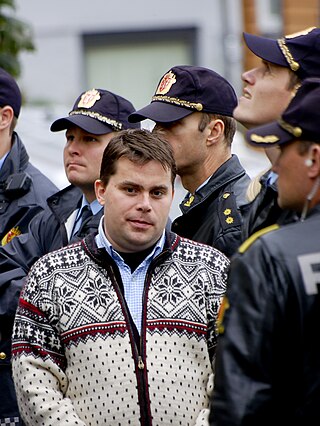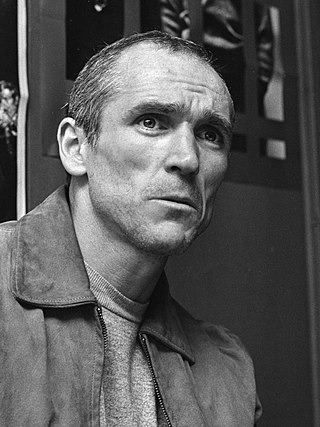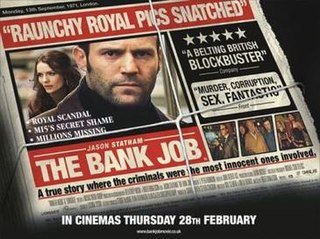
The Great Train Robbery was the robbery of £2.61 million from a Royal Mail train travelling from Glasgow to London on the West Coast Main Line in the early hours of 8 August 1963 at Bridego Railway Bridge, Ledburn, near Mentmore in Buckinghamshire, England.

The Spaghetti House siege took place between 28 September and 3 October 1975. An attempted robbery of the Spaghetti House restaurant in Knightsbridge, London, went wrong and the police were quickly on the scene. The three robbers took the staff down into a storeroom and barricaded themselves in. They released all the hostages unharmed after six days. Two of the gunmen gave themselves up; the ringleader, Franklin Davies, shot himself in the stomach. All three were later imprisoned, as were two of their accomplices.

Harry "Pete" Pierpont was a Prohibition era gangster, convicted murderer and bank robber. He was a friend and mentor to John Dillinger.
The Brink's-Mat robbery was one of the largest robberies in British history, with £26 million worth of gold bullion, diamonds, and cash stolen. It occurred at the Heathrow International Trading Estate, London, on 26 November 1983, from a warehouse operated by Brink's-Mat, a former joint venture between US security company Brink's and London-based company MAT Transport. The bullion was the property of Johnson Matthey Bankers Ltd. Micky McAvoy and Brian Robinson were convicted of armed robbery. Most of the gold has never been recovered. Lloyd's of London paid out for the losses, and several shooting deaths have been linked to the case.

David Aleksander Toska was the alleged "mastermind" behind the "NOKAS robbery" in Stavanger on 5 April 2004, one of the most profiled criminal cases in modern Norwegian history. The robbery resulted in the killing of a police officer, a very rare occurrence in Norway.

John McVicar was a British journalist and convicted one-time armed robber who escaped from prison.

Attila Ambrus, alias The Whiskey Robber, is a Hungarian former bank robber and professional ice hockey player. He became notorious during the 1990s for committing a string of undercover "gentleman robberies" in and around Budapest, Hungary, while working a day job as a goaltender. He became infamous in Hungary as a folk hero symbolic of the times in the decade after the introduction of capitalism to the former Communist state. Ambrus was eventually caught and imprisoned for about 12 years, released in 2012. His story was told in the 2004 book Ballad of the Whiskey Robber by author Julian Rubinstein and the 2017 film A Viszkis directed by Nimród Antal.

The 2006 Securitas depot robbery in Tonbridge, England, was the UK's largest cash heist. It began with a kidnapping on the evening of 21 February 2006 and ended in the early hours of 22 February, when seven criminals stole almost £53 million. The gang left behind another £154 million because they did not have the means to transport it.

Thomas Anthony "Tommy" Comerford, also known as "Tacker" and "Top Cat", was an English gangster. A longtime figure in Liverpool's underworld, Comerford dominated criminal activity in the Merseyside area, spending over 34 years in prison during the course of his criminal career. He was involved in narcotics, and was one of the first criminals to establish an international drug trafficking network in England.

The Bank Job is a 2008 heist thriller film directed by Roger Donaldson and written by Dick Clement and Ian La Frenais. It is based on the 1971 burglary of Lloyds Bank safety deposit boxes in Baker Street. It stars Jason Statham.
The Gang des postiches was a team of bank robbers that operated in Paris between 1981 and 1986, robbing around thirty banks.

The Graff Diamonds robbery took place on 6 August 2009 when two men posing as customers entered the premises of Graff Diamonds in New Bond Street, London and stole jewellery worth nearly £40 million. It was believed to be the largest ever gems heist in Britain at the time, and the second largest British robbery after the £53 million raid on a Securitas depot in Tonbridge, Kent, in 2006. The robbers' haul totalled 43 items of jewellery, consisting of rings, bracelets, necklaces and wristwatches. One necklace alone has been reported as being worth more than £3.5m. Britain's previous largest jewellery robbery also took place at Graff's, in 2003.

Edward Wilhelm Bentz was an American bank robber and Depression-era outlaw. He was associated with several high-profile public enemies during his criminal career, including Harvey Bailey, Albert Bates, George "Machine Gun" Kelly and Baby Face Nelson. He was eventually captured by the FBI and sentenced to Alcatraz.

On 18 February 2013, eight masked gunmen in two cars with police markings stole approximately €38,000,000 worth of diamonds from a Swiss-bound Fokker 100 operated by Helvetic Airways on the apron at Brussels Airport, Belgium, just before 20:00 CET. The heist was accomplished without a single shot being fired.

In April 2015, an underground safe deposit facility in Hatton Garden, London, owned by Hatton Garden Safe Deposit Ltd., was burgled.
Jeffrey Shuman is an American-French bank robber, dubbed "The Vaulter", considered to be one of Canada's most prolific bank robbers. In 1994, he pleaded guilty to robbing 14 banks in the United States, receiving a 12-year sentence, but was released in 2004, and fled the country while on parole. He then robbed 21 banks in Canada, before fleeing to France on his French passport. In 2016, he was extradited to Canada, and in 2017, was sentenced to 15 years in prison and ordered to pay back nearly $450,000 in restitution after pleading guilty to seven counts of robbery using a firearm.
The City bonds robbery of 1990 was a heist in which £291.9 million was stolen in London, England. The carefully planned operation made it seem at first as if a courier had been mugged on 2 May, yet the City of London Police soon realised that it was a sophisticated global venture which ended up involving participants such as the New York mafia, the Provisional Irish Republican Army (IRA), and Colombian drug barons. The robbery was one of the largest in world history.
Gilbert William Galvan Jr. is an American bank robber. Having spent many of his adult years in prison, Galvan fled to Canada where he assumed the name Robert Lee Whiteman and began a three-year spree robbing banks and jewelry stores in the 1980s. The media dubbed him the Flying Bandit and the Phantom Bandit. Galvan's exploits were the subject of a 1996 true crime book, The Flying Bandit, written by Robert Knuckle and Ed Arnold, which was adapted into the 2022 film Bandit.
On February 10, 1997, the Seafirst Bank branch of Lakewood, Washington, was robbed of $4,461,681 in cash by Billy Kirkpatrick and Ray Bowman, also known as the Trenchcoat Robbers. An investigation by the Federal Bureau of Investigation and the Internal Revenue Service caught the two, and they were both sent to 15 years in prison in 1999. It is one of the largest robberies in U.S. history.












